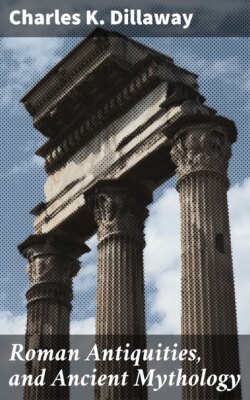Читать книгу Roman Antiquities, and Ancient Mythology - Charles K. Dillaway - Страница 12
На сайте Литреса книга снята с продажи.
Private Rights of Roman Citizens.
ОглавлениеTable of Contents
The right of liberty comprehended not only liberty from the power of masters, but also from the dominion of tyrants, the severity of magistrates, the cruelty of creditors, and the insolence of more powerful citizens. After the expulsion of Tarquin, a law was made by Brutus, that no one should be king at Rome, and that whoever should form a design of making himself a king, might be slain with impunity. At the same time the people were bound by an oath that they would never suffer a king to be created.
Citizens could appeal from the magistrates to the people, and the persons who appealed could in no way be punished, until the people determined the matter; but they were chiefly secured by the assistance of the tribunes.
None but the whole Roman people in the comitia centuriata could pass sentence on the life of a Roman citizen. No magistrate could punish him by stripes or capitally. The single expression, “I am a Roman citizen,” checked their severest decrees.
By the laws of the twelve tables, it was ordained, that insolvent debtors should be given up to their creditors, to be bound in fetters and cords, and although they did not entirely lose the rights of freemen, yet they were in actual slavery, and often more harshly treated than even slaves themselves.
To check the cruelty of usurers, a law was afterwards made that no debtors should be kept in irons, or in bonds; that the goods of the debtor, not his person, should be given up to his creditors.
The people, not satisfied with this, as it did not free them from prison, demanded an entire abolition of debt, which they used to call new tables; but this was never granted.
Each clan and family had certain sacred rights, peculiar to itself, which were inherited in the same manner as effects. When heirs by the father's side of the same family failed, those of the same gens succeeded in preference to relations by the mother's side of the same family. No one could pass from a Patrician family to a Plebeian, or from a Plebeian to a Patrician, unless by that form of adoption which could only be made at the comitia curiata.
No Roman citizen could marry a slave, barbarian or foreigner, unless by the permission of the people.
A father among the Romans had the power of life and death over his children. He could not only expose them when infants, but when grown up he might imprison, scourge, send them bound to work in the country, and also put them to death by any punishment he pleased.
A son could acquire no property but with his father's consent, and what he thus acquired was called his peculium as of a slave.
Things with respect to property among the Romans were variously divided. Some were said to be of divine right, and were held sacred, as altars, temples, or any thing publicly consecrated to the gods, by the authority of the Pontiffs; or religious, as sepulchres—or inviolable, as the walls and gates of a city.
Others were said to be of human right, and called profane. These were either public and common, as the air, running water, the sea and its shores; or private, which might be the property of individuals.
None but a Roman citizen could make a will, or be witnesses to a testament, or inherit any thing by it.
The usual method of making a will after the laws of the twelve tables were enacted, was by brass and balance, as it was called. In the presence of five witnesses, a weigher and witness, the testator by an imaginary sale disposed of his family and property to one who was called familiæ emptor, who was not the heir as some have thought, but only admitted for the sake of form, that the testator might seem to have alienated his effects in his life time. This act was called familiæ mancipatio.
Sometimes the testator wrote his will wholly with his own hand, in which case it was called hologrăphum—sometimes it was written by a friend, or by others. Thus the testament of Augustus was written partly by himself, and partly by two of his freedmen.
Testaments were always subscribed by the testator, and usually by the witnesses, and sealed with their seals or rings. They were likewise tied with a thread drawn thrice through holes and sealed; like all other civil deeds, they were always written in Latin. A legacy expressed in Greek was not valid.
They were deposited either privately in the hands of a friend, or in a temple with the keeper of it. Thus Julius Cæsar is said to have intrusted his testament to the oldest of the vestal virgins.
A father might leave whom he pleased as guardian to his children;—but if he died, this charge devolved by law on the nearest relation by the father's side. When there was no guardian by testament, nor a legal one, the prætor and the majority of the tribunes of the people appointed a guardian. If any one died without making a will, his goods devolved on his nearest relations.
Women could not transact any business of importance without the concurrence of their parents, husbands, or guardians.
